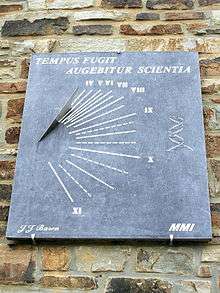Tempus fugit
Tempus fugit is a Latin phrase, usually translated into English as "time flies". The expression comes from line 284 of book 3 of Virgil's Georgics,[1] where it appears as fugit inreparabile tempus: "it escapes, irretrievable time". The phrase is used in both its Latin and English forms as a proverb that "time's a-wasting".

Usage

Tempus fugit is typically employed as an admonition against sloth and procrastination (cf. carpe diem) rather than a motto in favor of licentiousness (cf. "gather ye rosebuds while ye may"); the English form is often merely descriptive: "time flies like the wind", "time flies when you're having fun".
The phrase is a common motto, particularly on sundials and clocks. It also has been used on gravestones.
Some writers have attempted rebuttals: Time goes, you say? Ah, no! alas, time stays, we go. by H(enry) Austin Dobson 1840-1921. 'Hêd Amser! / Meddi Na! / Erys Amser / Dyn Â' on sundial at Univ of Bangor, North Wales. says the sundial was commissioned by Sir William Henry Preece, and offers an English equivalent: Time flies, thou sayest - Nay! Man flies; Time still doth stay. Another English version is: Time Flies, Say Not So: Time Remains,'Tis Man Must Go.
In the Georgics
The phrase's full appearance in Virgil's Georgics is:
| Original (Virgil)[1] |
Translation (Dryden)[2] |
Translation (Rhoades)[3] |
|---|---|---|
| Omne adeo genus in terris hominumque ferarumque | Thus every Creature , and of every Kind , The secret Joys of sweet Coition find : Not only Man's Imperial Race ; . . . |
Nay, every race on earth of men, and beasts, |
| et genus aequoreum, pecudes pictaeque volucres, | . . . but they That wing the liquid Air ; or swim the Sea , Or haunt the Desart , . . . |
And ocean-folk, and flocks, and painted birds, |
| in furias ignemque ruunt: amor omnibus idem. ... | . . . rush into the flame : For Love is Lord of all ; and is in all the same . |
Rush to the raging fire: love sways them all. |
| Sed fugit interea, fugit inreparabile tempus, | But time is lost , which never will renew , | Fast flies meanwhile the irreparable hour, |
| singula dum capti circumvectamur amore. | While we too far the pleasing Path pursue ; Surveying Nature , with too nice a view . |
As point to point our charmed round we trace. |
See also
References
- Vergilius Maro, Publius. Georgicon, III. c. 29 BC. Hosted at Wikisource. (in Latin)
- Dryden, John (trans.). The Works of Virgil: Containing His Pastorals, Georgics, and Æneis, 3rd ed., Vol. I, pp. 163–166. Jacob Tonson (London), 1709. Hosted at Google Books. Accessed 30 May 2014.
- Rhoades, James (trans.). Bucolics, Aeneid, and Georgics of Vergil. Ginn & Co. (Boston), 1900. Hosted at MIT. Accessed 30 May 2014.
External links
| Wikimedia Commons has media related to Tempus fugit. |

